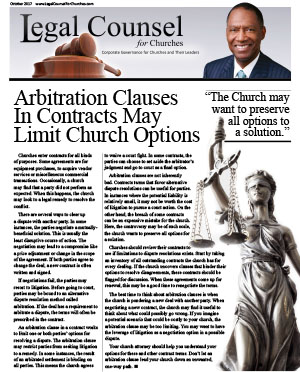Churches enter contracts for all kinds of purposes. Some agreements are for equipment purchases, to acquire vendor services or miscellaneous commercial transactions. Occasionally, a church may find that a party did not perform as expected. When this happens, the church may look to a legal remedy to resolve the conflict.
There are several ways to clear up a dispute with another party. In some instances, the parties negotiate a mutually- beneficial solution. This is usually the least disruptive course of action. The negotiation may lead to a compromise like a price adjustment or change in the scope of the agreement. If both parties agree to change the deal, a new contract is often written and signed.
If negotiations fail, the parties may resort to litigation. Before going to court, parties may be bound to an alternative dispute resolution method called arbitration. If the deal has a requirement to arbitrate a dispute, the terms will often be prescribed in the contract.
An arbitration clause in a contract works to limit one or both parties’ options for resolving a dispute. The arbitration clause may restrict parties from seeking litigation to a remedy. In some instances, the result of an arbitrated settlement is binding on all parties. This means the church agrees to waive a court fight. In some contracts, the parties can choose to set aside the arbitrator’s judgment and go to court as a final option.
Arbitration clauses are not inherently bad. Contracts terms that favor alternative dispute resolutions can be useful for parties. In instances where the potential liability is relatively small, it may not be worth the cost of litigation to pursue a court action. On the other hand, the breach of some contracts can be an expensive mistake for the church. Here, the controversy may be of such scale, the church wants to preserve all options for a solution.
Churches should review their contracts to see if limitations to dispute resolutions exists. Start by taking an inventory of all outstanding contracts the church has for every dealing. If the church uncovers clauses that hinder their options to resolve disagreements, these contracts should be flagged for discussion. When these agreements come up for renewal, this may be a good time to renegotiate the terms.
The best time to think about arbitration clauses is when the church is pondering a new deal with another party. When negotiating a new contract, the church may find it useful to think about what could possibly go wrong. If you imagine a potential scenario that could be costly to your church, the arbitration clause may be too limiting. You may want to have the leverage of litigation as a negotiation option in a possible dispute.
Your church attorney should help you understand your options for these and other contract terms. Don’t let an arbitration clause lead your church down an unwanted, one-way path.

